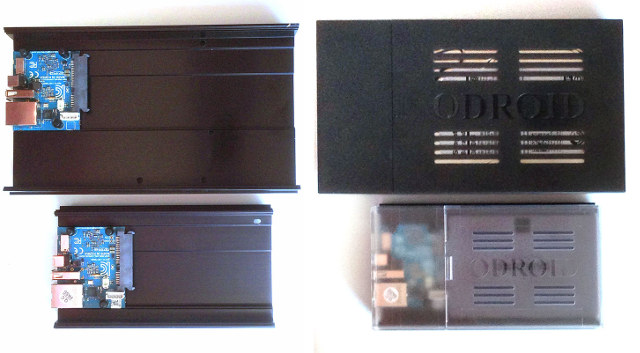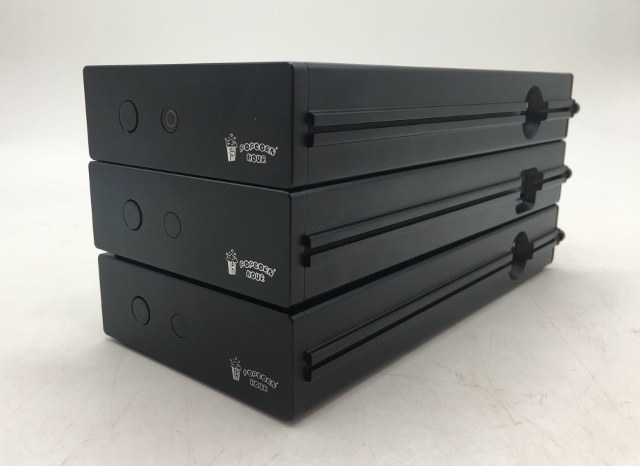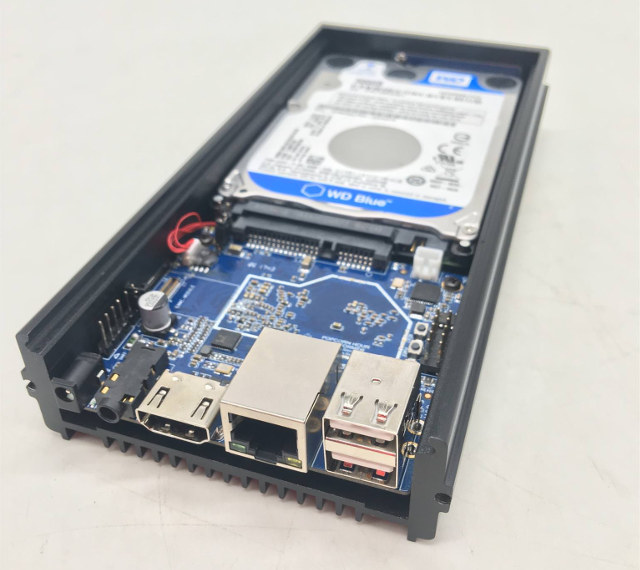Last summer, Hardkernel launched ODROID-HC1 Home Cloud 1 taking a single 2.5″ hard drive, and based on a modified version of their popular Exynos 5422 powered ODROID-XU4 board where they removed HDMI, and added a SATA interface (via USB 3.0), but based on the initial announcement, we also knew the Korean company was working on ODROID-HC2 supporting 3.5″ drives instead.
The device is not available yet, but guys at Armbian got an early unit, so we should not be waiting too long. Hardkernel will also have some competition for their ODROID-HC1 NAS, as Cloud Media (and Pine64?) are working on Rockchip RK3328 based Popcorn Hour Transformer & Transformer XL with support for 2.5″ and 3.5″ drives respectively.
Hardkernel ODROID-HC2

ODROID-HC2 preliminary specifications:
- SoC – Samsung Exynos 5422 octa-core processor with 4x ARM Cortex-A15 @ 2.0 GHz, 4x ARM Cortex-A7 @ 1.4GHz, and Mali-T628 MP6 GPU supporting OpenGL ES 3.0 / 2.0 / 1.1 and OpenCL 1.1 Full profile
- System Memory – 2GB LPDDR3 RAM PoP @ 750 MHz
- Storage
- UHS-1 micro SD slot up to 128GB
- SATA interface via JMicron JMS578 USB 3.0 to SATA bridge chipset
- The case supports 3.5″ drives
- Network Connectivity – 10/100/1000Mbps Ethernet (via USB 3.0)
- USB – 1x USB 2.0 port
- Debugging – Serial console header
- Misc – Power, status, and SATA LEDs;
- Power Supply
- 12V/2A via 5.5/2.1mm power barrel (2.5A might covered most use case, e.g. adding another USB 2.0 drive)
- Backup header for RTC battery
- Dimensions & weight – TBD
Basically everything should be the same, as HC1, except the power supply (12V vs 5V) and of course the dimensions of the metal enclosure, which is still used for cooling.
Tkaiser ran some preliminary tests, and could confirm HC2 is indeed software compatible with HC1/ODROID-XU4 using Armbian OMV image. Power consumption will be higher than for 2.5″ drives with around 5.3W measured while idle with a mechanical drive, and spikes up to 24Watts when the drive is spinning up, but apparently the 12V/2A power supply provided by hardkernel can somehow handle up to 30 Watts. Power consumption drops to 4.3W with an SSD, and 3.9W with no drive at all.
Performance was good at 100+ MB/s sequential read/write performance over the network. The reported SoC temperature will be slightly higher than on ODROID-HC1 because the 12V to 5V converter circuit produce heat that increases the PCB temperature by 3 to 4°C, but it should not be an issue.
Popcorn Hour Transformer

Popcorn Hour Transformer is quite similar to ODROID-HC1, but Cloud Media also left the HDMI 2.0 output, so it could be used as a Android TV box with hard drive too.
Preliminary specifications for Transformer based on photos, and OMV forums:
- SoC – Rockchip RK3328 quad core Cortex A53 processor with Mali-450MP GPU
- System Memory – 2GB or 4GB DRAM
- Storage
- micro SD slot
- Support for eMMC flash modules used in ROCK64 board
- SPI NOR flash
- SATA interface via USB 3.0 to SATA bridge chipset
- Support for 2.5″ drives
- Network Connectivity – Gigabit Ethernet
- Video Output – HDMI 2.0a up to 4K 60Hz with HDR support
- Audio Output – Via HDMI, and 3.5mm audio jack
- USB – 2x USB 2.0 ports
- Misc – Power button, IR receiver
- Power Supply – 5V/3A via power barrel jack
- Dimensions & weight – TBD

Transformer should be 100% compatible with ROCK64 development board, and based on latest info from #pine64 IRC channel, launch is planned for January, with Transformer XL coming a few months later. Cloud Media already listed Transformer for $95.90–$115.90, but accessing further information requires a password. Since the product has not been launched, prices may just be placeholders while designing the website.
In somewhat related news, Pine64 is working on a Rockpro64 board powered by Rockchip RK3399 SoC which will be demo’ed at FOSDEM 2018, and this may eventually lead to a Transformer Pro media NAS if there’s demand for it.

Jean-Luc started CNX Software in 2010 as a part-time endeavor, before quitting his job as a software engineering manager, and starting to write daily news, and reviews full time later in 2011.
Support CNX Software! Donate via cryptocurrencies, become a Patron on Patreon, or purchase goods on Amazon or Aliexpress




